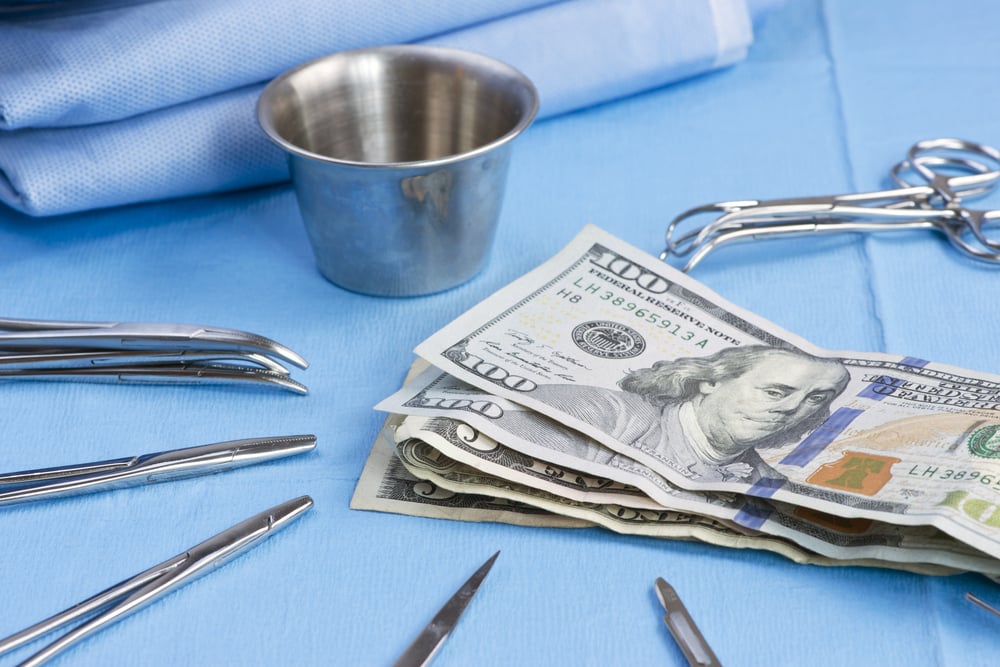HSA, The Stealth Wealth Builder

Word of the Week
Revenue (or sales on the income statement) is the money generated from normal business operations, calculated as the average sales price times the number of units sold.
Read on at Investopedia
Christopher Bullock, an English actor and dramatist, coined the famous phrase,
“Tis impossible to be sure of anything but Death and Taxes."

While death and taxes may be unavoidable (unless you're warren Buffett and Charlie Munger), limiting your exposure to these two entities (death and taxes NOT Warren Buffett and Charlie Munger) is a wise move.

Which brings me to the topic of discussion today, the HSA (health savings account), AKA the Stealth IRA. An account which allows us to save for healthcare and/or retirement in a tax efficient manner with the versatility that suits our individual needs. In this short blog, I will discuss just how tax efficient and versatile the HSA is and why you should include one in your retirement planning. Also, there are limitations and drawbacks to consider as well that I will highlight throughout. Finally, toward the end I will talk about one feature of the HSA that is the most beneficial but unfortunately 93% of their owners don't utilize. Before diving in, let's explore what an HSA is.
What is an HSA?

A Health Savings Account (HSA) is a "triple tax advantaged" account you establish with a qualified HSA trustee to cover medical expenses. You must be an eligible individual to qualify for an HSA. According to irs.gov, qualifications include:
- You are covered under a high deductible health plan (HDHP).
- You have no other health coverage except what is permitted under *Other health coverage* , later.
- You aren’t enrolled in Medicare.
- You can’t be claimed as a dependent on someone else’s 2020 tax return.
How does it work?
When you contribute to an HSA, you get a current-year tax deduction as the money is contributed to your HSA before income tax, medicare, and social security tax. Your money also grows in a tax-protected manner. Finally, you can pull the money out tax free, as long as you spend it on a qualified health care purchase. Hence, the HSA is the only triple tax advantaged account available in your arsenal. This is a massive benefit to capitalize on, but there are limitations on annual contributions.
As of 2021, if you have self-only HDHP (High Deductible Health Plan) coverage, you can contribute up to $3,600. If you have family HDHP coverage, you can contribute up to $7,200.

Now that we understand HSA’s a little bit more, let’s look at how we can use the HSA. There are three main ways to use the HSA (via The Money Guys):
- Spend it now: The Current year slush fund
- Spend it later: The Year over year slush fund
- Stealth IRA: The Long term investing Vehicle
Current Year Slush Fund

Dr. Boctor
Dr. Boctor is a single internal medicine resident with very little healthcare expenses. Dr. Boctor decided to open an HSA account during residency and only puts enough funds into the account to match the expenses for that year. At the end of each year, Dr. Boctor's account has a balance of $0.
Year Over Year Slush Fund
Dr. Dollar

Dr. Dollar is a healthy internal medicine resident with no medical history or medications. He’s married with an equally healthy partner. The Dollar family has been max funding their HSA over the past two years in anticipation of paying for the delivery of their first child. They will have $14,400 by the end of this year. Fast forward 9 months, The Dollar family had their first child. Mrs. Dollar had an uneventful delivery and was discharge the day after. The hospital billed them for $6,000.
The Dollar family has two options on how to deal with this.
Option A: The Dollars can pay the bill right away using the money saved in their HSA (I promise I'm not a rapper, but I rhyme effortlessly 😜).

Since it is a qualified health care purchase, they DO NOT pay taxes on the money withdrawn. This leaves them with a total of $8,400 remaining in their HSA. They continue to max fund their HSA every year taking advantage of the pre-tax savings. In addition, when they do incur healthcare related expenses, they withdraw funds from their account to cover the expenses.
Option B: The Dollar family decides to save their receipts to make a non taxable distribution later. For example, let's say after ten years of max funding their HSA, they are looking to put a down payment on a $330,000 home. The down payment is $68,000 which is exactly how much money they are holding in their HSA ($7,200/yr * 10years - $6000 that was taken out for their hospital bill = $66,000). Over the past ten years, they managed to incur $66,000 in qualified health care purchases and they diligently saved the receipts and logged the purchases in an excel document in case they were to ever be audited by the IRS. They withdraw the $66,000 tax free and use the money to make a downpayment on a new home.
The first two strategies highlight the benefit of pre tax contributions and withdrawals. However, similar to the general population, the option of tax free growth is underutilized. According to a study published by The Employee Benefit Research Institute (EBRI), only 7% of HSA owners had investments other than cash. Therefore, the remaining 93% of account owners are missing out on the benefit that gave this account the nickname "Stealth IRA."
The Stealth IRA
Under normal circumstances, If anyone were to make non healthcare related withdrawals/distributions, they would be subject to paying income tax, and an additional 20% tax. However, once a person reaches the age of 65, he/she now has the opportunity to make withdrawals from the HSA that will be taxed as ordinary income similar to a Traditional IRA.
The Traditional IRA is an Individual Retirement Arrangement where an individual can make tax deductible contributions are taxed as ordinary income upon withdrawal.
Dr. Penny

The Penny family has a similar story to the Dollar family. They have been max funding their HSA for ten years and have a total of $72,000 saved. Also, over the same ten years they have incurred $66,000 worth of medical expenses with the receipts to show for it. Finally, just like the Dollar family, they too are looking to purchase a $330,000 home by making a $66,000 down payment using funds from their HSA. The Penny's make a non taxable distribution totaling $66,000.
Although this story is awfully similar to the Dollar family, there is one major difference. The Pennys have been investing every cent (no pun intended) of their HSA in index funds for ten years. Their investment has been growing at an annual compounding rate of 7% a year. Doing the math, in ten years they will have:
$72,000*(1.07^5.5)= $104,458
5.5 years is used here because it is the average number of years the $72,000 contribution grows since it's an incremental investment of $7,200, not a lump sum of $72,000.
The Penny family makes a $66,000 distribution and after the withdrawal, they have $38,458 that will remain invested and growing for retirement and healthcare.
From this example, we see that investing in an HSA unlocks the true potential of this account, allowing the Pennys to beat out the Dollars (an oxymoron!)
🚫 Disclaimer:
This type of account may not be suitable for everyone. Health conditions or circumstances that result in high healthcare expenses will lead to greater out of pocket spending with a HDHP. Therefore, it could be beneficial to select a plan with a higher premium, but significantly lower deductible and ultimately less out of pocket expenses.
After going through a few hypothetical scenarios with imperfect, overly simplified math, It's clear to see the benefits of having a triple tax advantaged account at your fingertips that can serve as both a cash and investing vehicle.
Don't forget to discuss this with a trusty financial professional. I hope you found this post beneficial and I look forward to your successful financial journey!
How to invest with HSA
Link to blog post coming soon!
References


/US_healthcare-5c65ea9f46e0fb0001ec9c37.jpg)
/Doctor-with-patient-88a3ebd77c444e5c90f706873f073586.jpg)












